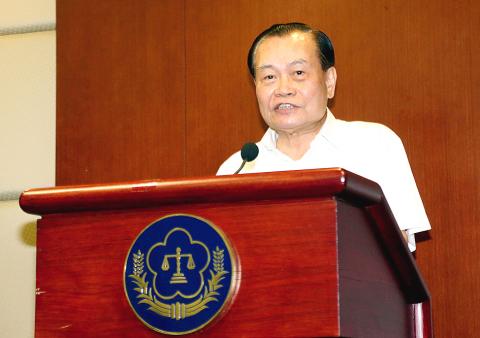Prosecutor-General Huang Shih-ming (黃世銘) yesterday accused Minister of Justice Tseng Yung-fu (曾勇夫) and Taiwan High Prosecutors’ Office Head Prosecutor Chen Shou-huang (陳守煌) of illegally lobbying for a lawsuit involving Democratic Progressive Party Legislator Ker Chien-ming (柯建銘).
Tseng announced his resignation later yesterday.
A spokesman for the Supreme Prosecutors’ Office Special Investigation Division (SID), Yang Jung-tsung (楊榮宗), told a press conference earlier yesterday that after Ker on June 18 was found not guilty of embezzling funds from Formosa Telecom, he asked Legislative Speaker Wang Jin-pyng (王金平), a member of the Chinese Nationalist Party (KMT), to lobby Tseng and Chen to use their influence to stop a prosecutor from appealing the case with the Supreme Court.

Photo: CNA
They influenced Lin Shiow-tao (林秀濤), the prosecutor in charge of Ker’s breach of trust case, and Lin did not appeal the ruling, Yang said, adding that Tseng would be referred to the Control Yuan for an impeachment probe, while Chen would be subject to an administrative evaluation.
Tseng and Chen are not likely to face any criminal charges because they did not receive any kickbacks or other rewards for their lobbying efforts, the SID said.
Huang said in a statement that he was deeply saddened by the influence peddling charges because the two men’s behavior had seriously tarnished the reputation and credibility of the judiciary.
Huang said that as the country’s top prosecutor he was determined to resist improper interference and maintain the independence and impartiality of prosecutors.
Huang said SID prosecutors unexpectedly stumbled upon the alleged irregularities while monitoring Ker’s mobile phone in relation to another case.
After Ker was acquitted in June, he made a telephone call to Chen, asking Chen’s office not to appeal the case, the SID said, adding that Chen then met with Lin and hinted that she should not appeal the case, saying the legislature was concerned about the case and it is in charge of the office’s annual budget.
The SID said that because Ker could not make sure Chen would influence the prosecutor he also asked Wang to lobby for him.
On June 28, Wang made a telephone call to Ker, saying that Chen had mentioned the matter to Tseng and the latter had agreed to handle it, the SID said, adding that on the next day, Wang and Tseng met in New Taipei City (新北市) and Wang later called Ker to say the case had been taken care of.
Both Tseng and Chen denied the accusations
“It is a shame that the SID is accusing people with false facts,” Tseng told a press conference, adding that the SID made the accusations due to “personal resentment.”
Separately yesterday, Chen said he never told the prosecutor not to appeal Ker’s case, while Lin said she decided not to appeal because she found no evidence suggesting irregularities.
Meanwhile, Ker said in a statement that President Ma Ying-jeou (馬英九), who also doubles as Chinese Nationalist Party (KMT) chairman, had manipulated the judiciary to carry out a purge within the KMT.
Wang was on a vacation with his family in Malaysia and did not immediately respond to the allegations.
Additional reporting by Shih Hsiu-chuan and CNA

CHAOS: Iranians took to the streets playing celebratory music after reports of Khamenei’s death on Saturday, while mourners also gathered in Tehran yesterday Iranian Supreme Leader Ayatollah Ali Khamenei was killed in a major attack on Iran launched by Israel and the US, throwing the future of the Islamic republic into doubt and raising the risk of regional instability. Iranian state television and the state-run IRNA news agency announced the 86-year-old’s death early yesterday. US President Donald Trump said it gave Iranians their “greatest chance” to “take back” their country. The announcements came after a joint US and Israeli aerial bombardment that targeted Iranian military and governmental sites. Trump said the “heavy and pinpoint bombing” would continue through the week or as long

TRUST: The KMT said it respected the US’ timing and considerations, and hoped it would continue to honor its commitments to helping Taiwan bolster its defenses and deterrence US President Donald Trump is delaying a multibillion-dollar arms sale to Taiwan to ensure his visit to Beijing is successful, a New York Times report said. The weapons sales package has stalled in the US Department of State, the report said, citing US officials it did not identify. The White House has told agencies not to push forward ahead of Trump’s meeting with Chinese President Xi Jinping (習近平), it said. The two last month held a phone call to discuss trade and geopolitical flashpoints ahead of the summit. Xi raised the Taiwan issue and urged the US to handle arms sales to

State-run CPC Corp, Taiwan (CPC, 台灣中油) yesterday said that it had confirmed on Saturday night with its liquefied natural gas (LNG) and crude oil suppliers that shipments are proceeding as scheduled and that domestic supplies remain unaffected. The CPC yesterday announced the gasoline and diesel prices will rise by NT$0.2 and NT$0.4 per liter, respectively, starting Monday, citing Middle East tensions and blizzards in the eastern United States. CPC also iterated it has been reducing the proportion of crude oil imports from the Middle East and diversifying its supply sources in the past few years in response to geopolitical risks, expanding

An Emirates flight from Dubai arrived at Taiwan Taoyuan International Airport yesterday afternoon, the first service of the airline since the US and Israel launched strikes against Iran on Saturday. Flight EK366 took off from the United Arab Emirates (UAE) at 3:51am yesterday and landed at 4:02pm before taxiing to the airport’s D6 gate at Terminal 2 at 4:08pm, data from the airport and FlightAware, a global flight tracking site, showed. Of the 501 passengers on the flight, 275 were Taiwanese, including 96 group tour travelers, the data showed. Tourism Administration Deputy Director-General Huang He-ting (黃荷婷) greeted Taiwanese passengers at the airport and